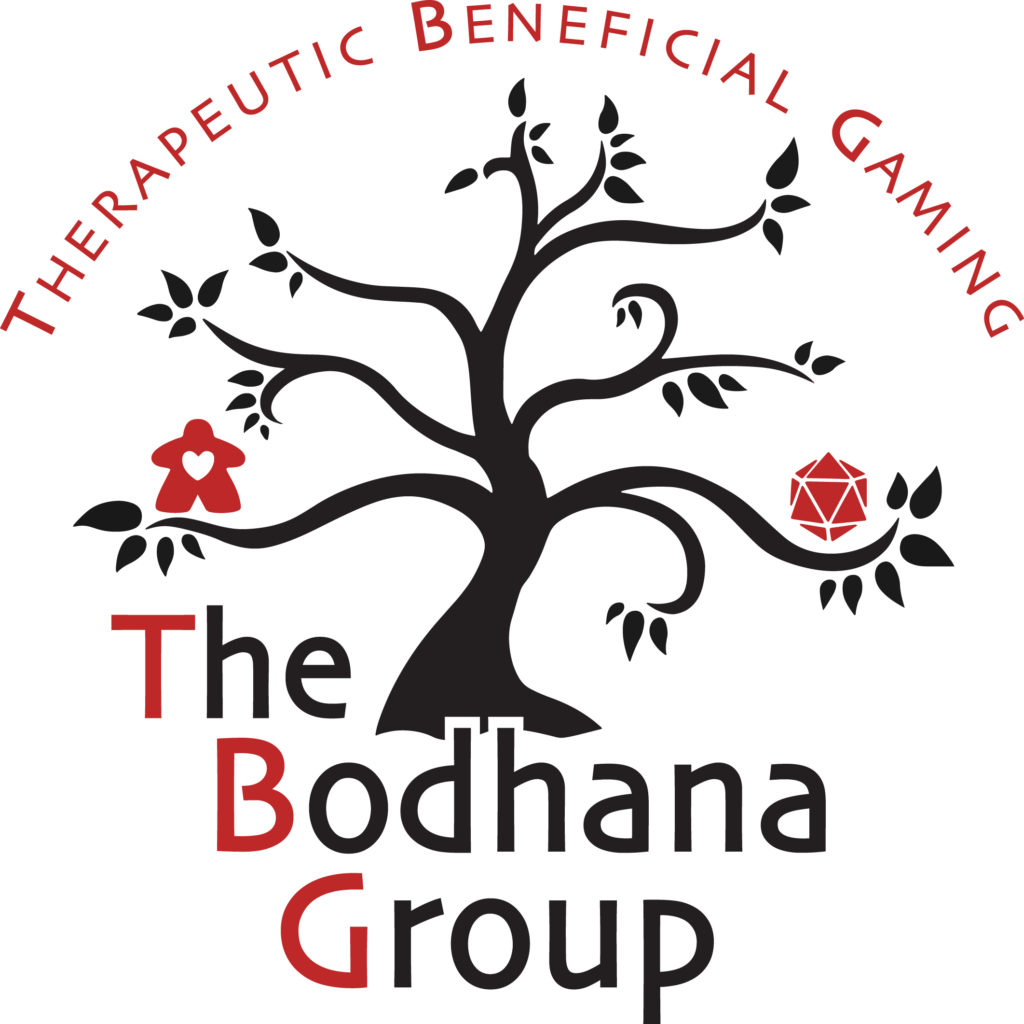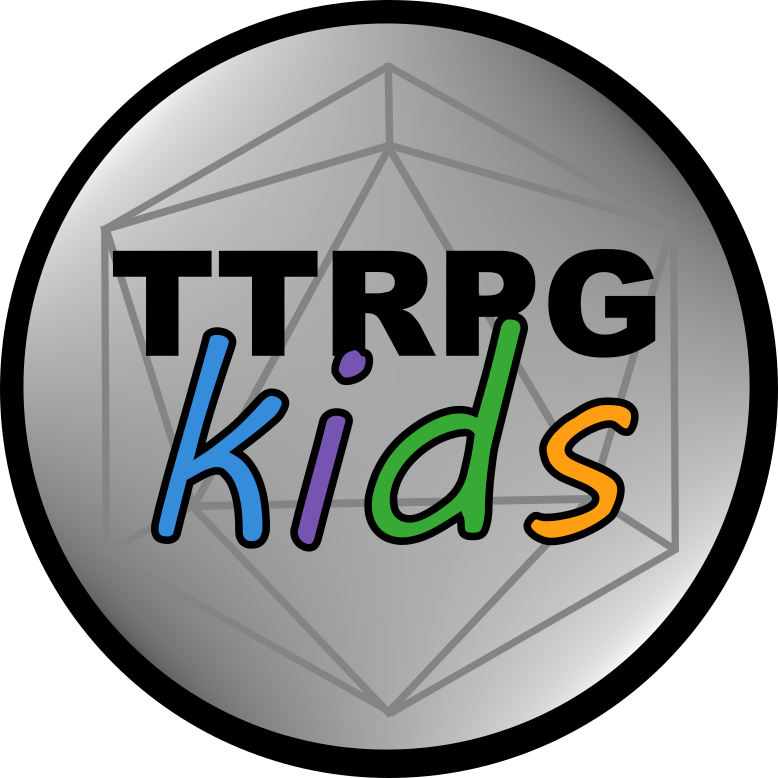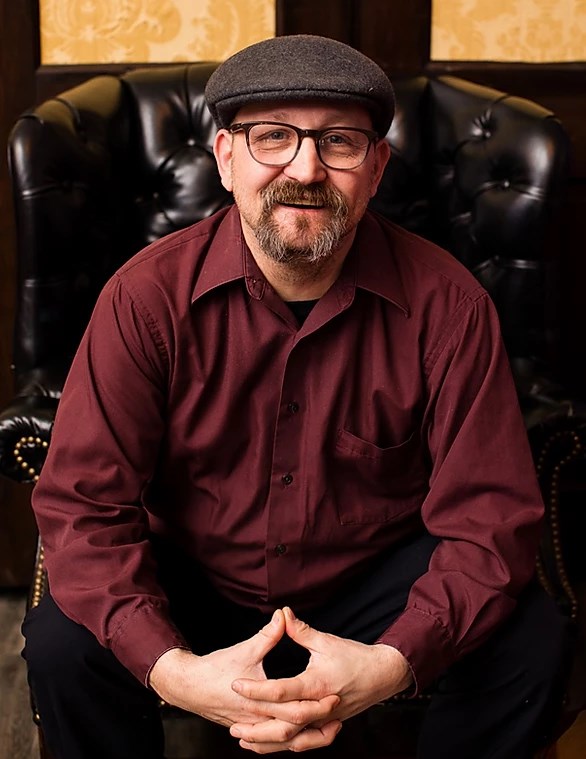Interview with Jack Berkenstock from The Bodhana Group!
*this is a transcribed interview that has been edited, with permission from the interviewee, to improve ease of reading
Can you tell us a little bit about yourself?
Sure! So, I’m a master’s level clinician. I have been in the human services field for about 26 years, and I got my formal degree, a Master’s in Human Services from Lincoln University in 2008.
I have worked with inner city education and recreation, in-patient youth settings, community-base settings for youth, as well as for adults, with intellectual and developmental disability.
I would have to say that most of my tradition is from Buddhist psychology, which kind of borders into CBT as my go-to… and I’ve been a gamer since the age of 12, so that’s about 38 years behind the screen.
That’s my CV and GV – my gamer vitae!
What is one of your favorite in-game TTRPG moments?
I have a perfect example here! We are playing a game of Kids on Brooms from Renegade Games by Doug Levandowski, Jonathan Gilmour, and Spenser Starke.
The group is just a bunch of other therapists and practitioners who use gaming in their practices, and, at our magic school, there’s a class called Norm Ec because people who don’t have magic are “normies”.
So, I asked who the professor is for our Norm Ec class, and the players answered that it needed to be, of course, the greatest normie ever, Norm from Cheers.
Now, one of the NPCs is George Wendt, the actor who played Norm in Cheers, teaching a class for mages to learn stuff like how to cook like a normie so they can better blend in with normal people.
During the course of the adventure there’s all kinds of chaos hitting the school, and he’s like, “Guys… this is just like a big play! It’s an acting thing!”
He thought it was the most method acting thing you could do!
One of the players rolled excessively well to try and convince him when all they wanted to do was magically tap the information to him to indicate everything was real. With them rolling so well, I asked if I could have some creative license here, then said, “You have now made George Wendt, the actor, into a mage. You have given him magic powers, and he is now a wizard!”
So, one of my claims to fame now, is that I have turned George Wendt, Norm from Cheers, into a wizard.
Can you tell us about The Bodhana Group?

Bodhana was founded in 2009. There were a number of us who were working at a residential treatment facility for juveniles on the sexually problematic behaviors unit. So, we worked with kiddos who had engaged in a particular type of problematic behavior or who were victims of abuse themselves.
It was at a time when Pennsylvania had chosen to kind of go away from residential care to community-based. The facility shut down, and we had no job. Our specialty now was going to community-based care, and we didn’t know what to do.
We started Bodhana, initially, as a training and consultation company to help people work through compassion fatigue and vicarious trauma via the job setting, and, over time, we realized that there weren’t a lot of people taking training dollars for this right now, so we ran our first Save Against Fear.
It was at that time we met Rich Thomas. He’s the grand poobah, if you will, of Onyx Path Publishing and former creative director of White Wolf Publishing, and we were having conversations about what Bodhana did and that we were gamers. We weren’t golfers, and we didn’t have cars to auction off, so why not run a game con as a fundraiser!
He started sharing stories and letters sent to Onyx Path and White Wolf about how roleplaying within the World of Darkness settings let some players address some of the more problematic elements of their past. As we often say, beating the monsters in the game leads to beating the monsters within.
We were like… we actually used to run D&D on the unit. Hindsight is never perfectly 20/20, but we pieced together some of the behavioral changes we had seen for kids on the unit as a result of RPGs. We started to break down what gaming had also done for us in our lives, and we conceptualized, at that moment, the Bodhana model, which is about the power of the narrative and story to drive the healing and betterment process. We even made the distinction between the method’s therapeutic benefits and clinical benefits, which are, inherently, very different. After that, we didn’t use this with clients until after about three years of looking at different techniques and therapeutic traditions and modalities.
We figured, if people are getting this benefit on their own, what if you “weaponized” it, where you have trained and experienced practitioners who are also trained and experienced game masters that inject therapeutic and clinical content into what it is they are doing. That’s when we started working with groups like Olivia’s House in York, which is a grief and loss center, and that catapulted us forward.
Here we are now, 14 years later from where we started, and we have a very robust training program, consultation and training, our own game that’s set for publishing… that’s the story of Bodhana in a nutshell.
How does Bodhana use TTRPGs for therapeutic practices?
We have multiple reasons for kids coming to group; we have kids with social skill and social interaction challenges, folks with social anxiety, generalized anxiety, or depression, people working through grief, loss, and trauma. So, we say, “We know why you’re here and what you want to talk about. Let’s make a character that represents you, and we’ll create a specific storyline and challenges from there.”
One of the things that we uniquely do is that we not only see gaming as a direct path to wellness but also believe that it is a passport to selfcare.
When the kiddos are ready, we run them through the game in their character AND teach kids how to be facilitators. We teach them how to run a game, how to set a plotline, etc, and they generate a side quest to run while their character plays a backseat and they are the GM.
They’re now practicing active listening skills, reflective listening, and responding to other players… their set plot is going to change because no plot survives first contact with the party.
One of my favorite stories is of a young man who was diagnosed with autism, and he wanted to be a GM. We went through all the permutations with him, and the first time he ran it, I lovingly refer to it as a train-wreck. It was open mic night for him. He had a story in his mind and was just telling HIS story, and all of our kiddos were like, “Can I do anything in the adventure?”
I’m like, “I’m not the GM; don’t ask me. I’m a player just like you.”
The first time, he was just telling HIS story, he wasn’t listening… a first time GM kind of thing. We asked if he wanted open feedback, and he said yes.
We talked through the feedback, and everyone gave it to him, and he said he’d like to try again.
We waited a while, and then it was like 180 degrees. He had a general idea of a story, but then he changed it on the fly and listened to the players, and his mom was like, “He’s researching, and he’s contacting the guys through your discord group that you have for them to chat! I’ve never seen him this excited about something!”
His mom felt that a lot of the confidence that he built in that group led him to being better at job interviews and being better at not just talking with family or the same people at gatherings.
There are so many different stories that I could tell about these moments of growth. A lot of people look at the game, but we have to look at it as the whole person. They’re not just a person in my group. We ask why don’t we look at running a game session at one of these local stores, and we all just refer to each other in character names, so there’s no HIPAA worries, but we normalize the practice.
We transition our kiddos into groups at their schools or libraries or for college via saying hey… while you’re applying for college, let’s see if there’s a game club on campus that you can hook up with. We’re turning it from not just a personal growth opportunity but also to a path toward natural support systems in more organic ways.
Let’s use gaming now for people who are having trouble finding their own tribe.
We hear about kids starting a game group at their school, and it’s up to seven members and they’ll say, “Man, you were right! Sometimes players can really confuse your plot!”
It’s just so cool to see that compassion or getting kids who used to fall into the bad crowd coming back saying, “I have my gamer friends now, I don’t need those knuckleheads.”
It’s awesome!! And it’s not that we don’t have knuckleheads, but we’re a nicer breed of knuckleheads, I guess? We’re positive knuckleheads.
Do you have any closing bits of advice, shout outs, etc?
My first piece of advice is going to sound self-serving, but it, truthfully, is not. There are a lot of folks that I know who are very enticed by the coolness factor of “I’m a gamer and I’m a therapist… I can do this!”
There are a lot of things that we’ve learned over the 10+ years while we’ve been running these games therapeutically that…. They’re not necessarily more complex, but it’s more complicated to run these sometimes. There are a lot of things to consider.
I would advise anyone considering using this in their practice to get some kind of training or consultation on some of the ins and outs of how to do this, and that’s not just Bodhana because there’s Geek Therapeutics, there’s Game to Grow… there’s a ton of organizations.
I think for this to fully take off and be fully recognized, we need to be respectful of the fact that there’s a lot of good that could be done with this work, but there’s also a lot of situations where it could go badly. Some game tables have cliques or they box other people out. There’s a lot of ways to run your table that line up with running your group, so I just encourage anyone out there even though it’s a bit of extra work, that it’s always good to get some type of training or consultation from others who have been doing this for some time.
We make mistakes, as with any therapeutic process, and you’re going to look back on different approaches. It’s a lot more than just playing a game and having fun.
We also have published research and metrics that you can find on our site.
And also… don’t use this therapy on your friend group, and even for parents – be very careful about what you inject into role-playing because we become what we play. It’s an important consideration.
In the next couple days and weeks, we’ll have all the details of our next Save Against Fear, which we’ll have over the weekend of November 9th – 12th in York, PA. Thursday and Friday that week will be educational and therapist panels and workshops leading into the con, so come for the classes and stay for the games!
Also, be on the lookout for our upcoming role-playing game, Branch Riders, which is going to be published by Onyx Path Publishing. Hopefully we’ll kickstart by the end of the year. It’s a system for fun that’s more easily used by professionals, so I’m not going to say it’s a therapy game, but it’s a game that lends itself very easily to educational and therapeutic benefits.
And… if you’re going to be at Origins in June, Bodhana be there at booth #820!
Thank you very much for doing the interview, and I’m looking forward to chatting at Origins!
Please go check out The Bodhana Group and Save Against Fear and…. If you liked this post, make sure to subscribe to the TTRPGkids monthly newsletter to stay up to date on the latest reviews, tips and tricks, game and podcast list updates, and more! Thank you for playing tabletop RPGs with your kids and sharing this awesome hobby with the next generation!


4 thoughts on “Interview with Jack Berkenstock from The Bodhana Group!”